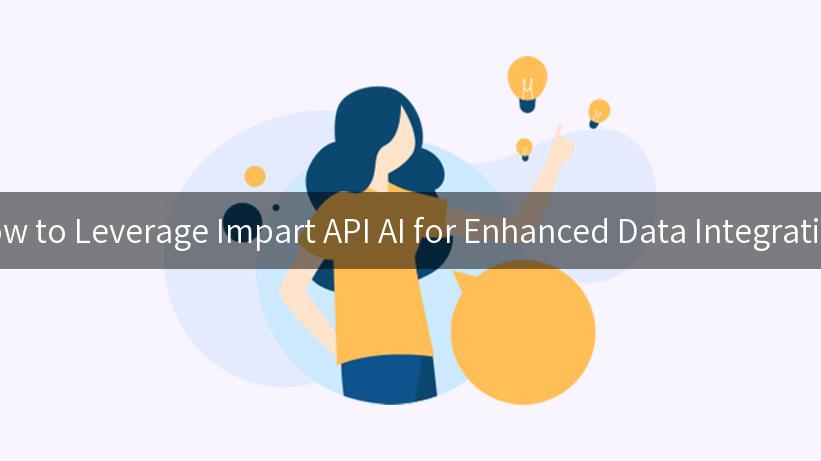
In today’s fast-paced digital landscape, businesses are increasingly challenged to manage and integrate vast amounts of data from various sources effectively. One solution that has gained traction is the use of APIs, specifically leveraging Impart API AI for enhanced data integration capabilities. This article will delve into the principles of API calls, LiteLLM, API gateways, Basic Identity Authentication, API Keys, and how they can improve data integration processes.
What is Impart API AI?
Impart API AI is an advanced tool designed to enable seamless communication between different software applications. This API provides robust functionalities to facilitate data exchange and integration processes. The ability to leverage AI capabilities within this API allows businesses to enhance their decision-making processes, automate tasks, and analyze data more efficiently.
Key Features of Impart API AI
-
AI-Driven Insights: With powerful AI algorithms, the Impart API can process and analyze data in real-time, offering actionable insights that can lead to informed business decisions.
-
Enhanced Data Integration: Streamlining data across various platforms and applications is effortless with the Impart API, allowing for improved workflow and resource utilization.
-
Scalability: Impart API is designed to handle varying workloads, ensuring that it meets your business’s growing data integration needs without compromising performance.
-
Security Procedures: Implementing robust security measures such as Basic Identity Authentication ensures that only authorized users can access sensitive data.
Getting Started with API Calls
An API call is a request made to a server for data or to perform a specific action. In the context of Impart API AI, making an API call can help retrieve relevant data efficiently. Here’s a breakdown of how to perform an API call with Impart API.
Example of API Call Using Curl
To illustrate how API calls work, here’s a sample command line using curl to interact with the Impart API:
curl --location 'http://host:port/path' \
--header 'Content-Type: application/json' \
--header 'Authorization: Bearer YOUR_API_KEY' \
--data '{
"query": "SELECT * FROM users WHERE id = 1;"
}'
Ensure to replace host, port, path, and YOUR_API_KEY with your actual service endpoint and authorization details.
Implementing LiteLLM in Data Integration
LiteLLM is a lightweight Language Model implementation that can enhance various data processing tasks, including natural language processing and machine learning operations. By integrating LiteLLM with Impart API AI, businesses can automate data extraction and classification processes, leading to significant efficiency improvements.
Advantages of Using API Gateway
An API gateway acts as a single entry point for managing and routing API calls to the appropriate backend services. With Impart API AI, using an API gateway can provide several advantages:
1. Centralized Management:
An API gateway allows centralized control of API calls, making it easier to enforce policies, manage versions, and monitor usage.
2. Improved Security:
With the implementation of Basic Identity Authentication and API Keys, businesses can ensure that only authenticated users can access specific APIs, safeguarding sensitive data.
3. Load Balancing:
An API gateway can intelligently distribute incoming API traffic across multiple servers, optimizing performance and reducing response times.
4. Analytics and Monitoring:
Collecting detailed analytics and monitoring API usage helps businesses understand user behavior, track performance, and identify potential issues.
| Feature |
Benefits |
| Centralized Management |
Simplifies API lifecycle management |
| Improved Security |
Reduces unauthorized API access |
| Load Balancing |
Enhances performance and responsiveness |
| Analytics and Monitoring |
Provides insight into usage patterns |
How to Set Up Basic Identity Authentication
Security is a prime concern for any business using APIs. Basic Identity Authentication is a straightforward method to ensure that your API is secured against unauthorized access. Here’s a step-by-step guide to implement Basic Identity Authentication for the Impart API AI:
-
Generate API Key:
Log in to your Impart API management console and create a new API Key that will be used for authentication.
-
Configure the API Gateway:
Integrate your API Key into the API gateway configuration, ensuring that all requests made must include the API Key in the headers.
-
Define Access Permissions:
Limit access to certain endpoints based on user roles and permissions to enhance security.
Conclusion
Leveraging Impart API AI along with technologies like LiteLLM, API gateways, Basic Identity Authentication, and API Keys can significantly enhance data integration processes within an organization. The combination of these tools allows businesses to automate tasks, derive meaningful insights from data, and ensure robust security measures are in place.
APIPark is a high-performance AI gateway that allows you to securely access the most comprehensive LLM APIs globally on the APIPark platform, including OpenAI, Anthropic, Mistral, Llama2, Google Gemini, and more.Try APIPark now! 👇👇👇
As you embark on your journey to enhance your data integration processes with Impart API AI, remember to prioritize security, automate wherever possible, and analyze data to optimize your decision-making. With the right implementation strategies, your business can fully harness the power of modern API technologies and propel itself towards greater success.
Code Example for Authentication
To ensure secure API calls while working with Impart API AI, here is a code snippet demonstrating how to authenticate using the API Key:
import requests
api_key = 'YOUR_API_KEY'
url = 'http://host:port/endpoint'
headers = {
'Content-Type': 'application/json',
'Authorization': f'Bearer {api_key}'
}
response = requests.get(url, headers=headers)
if response.status_code == 200:
data = response.json()
print(f"Data retrieved: {data}")
else:
print(f"Error occurred: {response.status_code}, {response.reason}")
By following best practices in API management, utilizing LiteLLM for data processing, and implementing user authentication, companies can transform their data integration processes into a streamlined and secure operation, ultimately enhancing overall productivity and innovation.